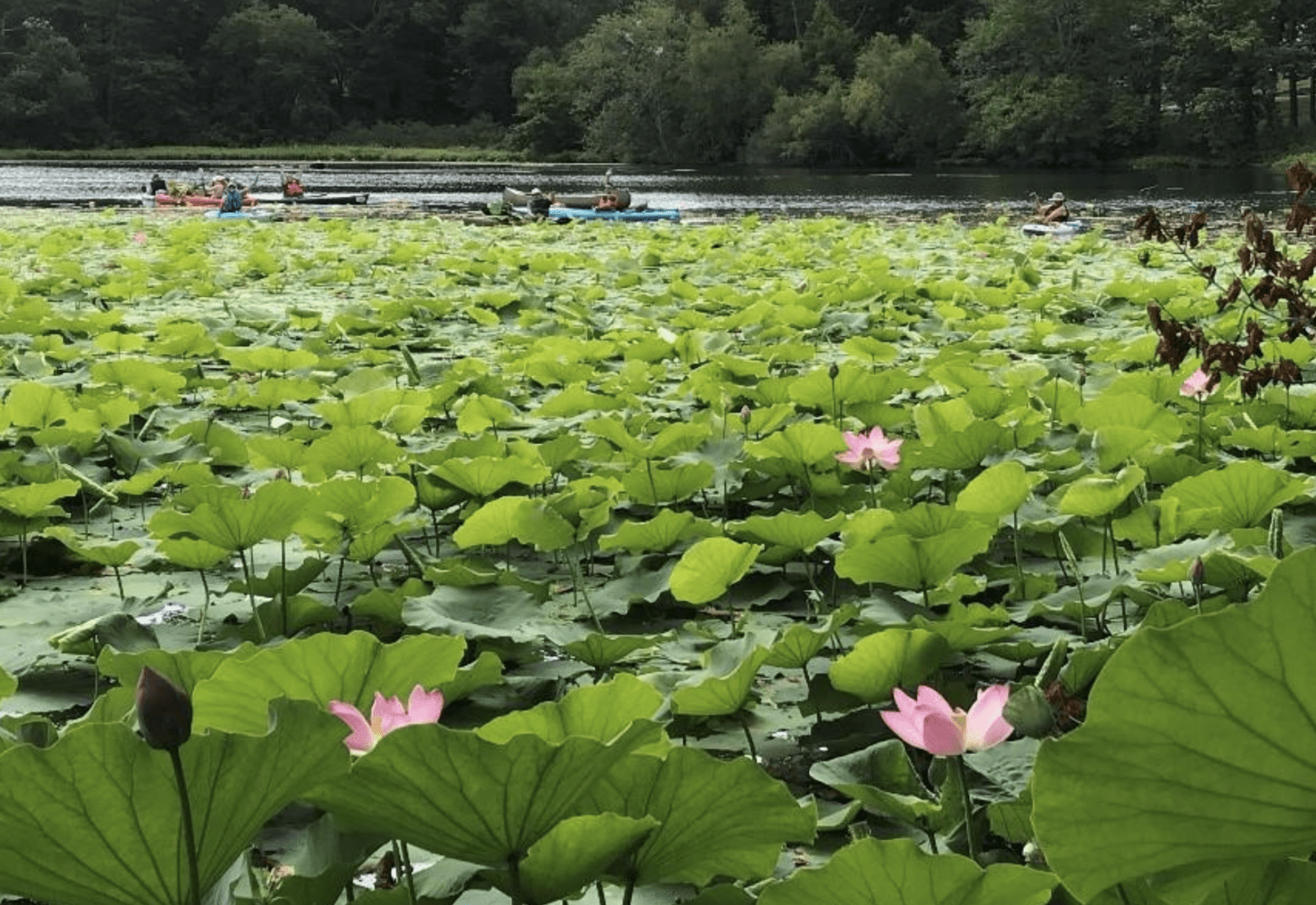Search Posts
Recent Posts
- To Do in RI: 2-day Newport Flower Show – Authors on floral design to speak June 21, 2025
- In the News… quick recap of the week’s news 6.21.25 June 21, 2025
- Providence Art Club Prestigious National Open Juried Exhibition Begins June 21, 2025
- Burn with Kearns: “30-day Shreds” Fail the 50+ Market. What To Do. – Kevin Kearns June 21, 2025
- Rhode Island Weekend Weather for June 21/22, 2025 – Jack Donnelly June 21, 2025
Categories
Subscribe!
Thanks for subscribing! Please check your email for further instructions.

Aquatic weed treatment Oct. 24 at Cranston’s Meshanticut Pond, local leaders meet
Photo: Meshanticut Lake, RIDEM
The Rhode Island Department of Environmental Management (DEM) is advising the public that Meshanticut Pond in Meshanticut State Park, Cranston and Silver Spring Lake, North Kingstown will receive treatments to control infestations of invasive aquatic plants, including sacred lotus, variable water milfoil, and fanwort on Oct. 24.
The aquatic weed control treatments are specifically targeted for the invasive nuisance plants and does not harm fish or other aquatic species. These waterbodies are popular with anglers and boaters and are stocked with trout several times during trout season.
Anglers and boaters are advised to avoid using these waterbodies on Oct. 24 when the treatments will be applied. Signs will be posted with information about temporary water use restrictions. During treatment, users should avoid impeding the applicator staff. Neighbors and other users of the pond should not allow domestic pets to drink from the water for at least three days.
Cranston Meeting


A community meeting was held the day before mitigation was to take place, at the Cranston Public Library on Oct. 23, with representatives of the RI Department of Environmental Management (RI DEM), Sen. Hanna Gallo and Rep. Barbara Fenton-Fung. Fenton-Fung to “tackle the significant problems at Meshanticut Lake”. Stay tuned, here, for an update from that meeting. We have asked Rep. Fenton-Fung to provide us with that.
In 2021, Fenton-Fung noted several issues with the pond beyond the lotus blooms and invasive vegetation, including dead, unhealthy and fallen trees and branches, and concern over infrastructure on the walking loop such as cracked pavement and damaged steps and walkways, and its difficult accessibility for those with physical issues such as wheelchairs.
Fenton-Fung hoped at that time that the park would be a priority for work, but RI DEM noted the limitations due to staffing and funds, and that local elected leaders say they’ve been told by the state about limited resources and staffing. At that time, RI DEM said they were “looking forward to working with Gov. McKee to push for more resources in the next session of the legislature”.
The park has long been intended for transference to the city for ownership, but as Mayor Ken Hopkins has noted, before that happens, addressing the park’s condition would need to come from the state, with significant investments made in its repair. In 2021 he said, “There’s been back-and-forth bantering about us taking it back … I’d love to do it, but not under the conditions right now,” the mayor said.
Michael Healey, head of RI DEM said the state estimated $50M back in 2021 would be needed to repair the state’s parks and areas. Based on the work needed at Meshanticut Pond, repairing roads, erosion control, tree work, repairing and installing benches – RI DEM estimated the needed investment at the park would total between $2 million and $2.5 million.
While ADA accessibility has been a priority of Fenton-Fung, the basic infrastructure and dealing with the invasive plants are even a greater priority. Chris Paplauskas, the city councilor from the area, also noted that repairs need to be made prior to the city taking over its ownership, recognizing the financial drain, particularly to remove invasive plants permanently, that could be brought on the city, if this were not done.
The meeting last night was held simultaneously with the Cranston City Council meeting. No agenda was listed for that meeting. Staff from DEM’s Director’s Office, Office of Water Resources, and Division of Parks and Recreation were set to be in attendance.
___
On Oct. 2, DEM and students from the University of Rhode Island removed 96 bags of the three-acre sacred lotus population at Meshanticut Pond as part of a collaborative research project studying the most effective methods to treat and manage the invasive aquatic plant. Sacred lotus is a highly aggressive, invasive species that threatens a healthy balance of native plants and impedes fishing and boating opportunities.
The plant was illegally transplanted into the pond in 2014 and has grown considerably each year, covering approximately one-quarter of the 12-acre pond in ten years. In 2019, DEM held several community harvesting events to remove the plant from the pond. Despite these efforts and DEM treating the plant with permitted herbicides in 2020 and 2021 to manage its growth, the stubborn and aggressive plant has continued to persist and spread over the pond.
The lotus seeds were put into the water, innocently, by a local resident, in memory of a woman who had passed away, seeing the lotus as representative of spiritual significance.
Aquatic weed infestation is a nuisance to anglers, boaters, and swimmers and can affect proper management of freshwater ponds for wildlife. To help control the spread of invasive species, the use of external felt-soled or any natural or synthetic porous material capable of absorbing water in any freshwaters in Rhode Island is strictly prohibited. This includes any waters shared with adjacent states in which Rhode Island fishing regulations apply.
The transport of any plant or plant part into or out of any Rhode Island waterbody on boats, vessels, other water conveyances, vehicles, trailers, fishing supplies, or any other equipment is also prohibited. It is recommended that all boaters thoroughly clean their vessels and equipment of attached weeds before and after using the freshwaters of the state. For more information on preventing the spread of aquatic invasive species, click here.

COMMENT from Rep. Barbara Fenton-Fung (rep-fenton-fung@rilegislature.gov):
Note: We are posting a message received from Rep. Fenton-Fung and agreed to print it here:
“As unfortunately the author of this article was unable to attend the meeting, this article can be misleading in that it doesn’t reflect what happened at last night’s event, and is referencing things from years ago at several points.
The Meshanticut precinct is brand new to my House District 15, starting in January 2023. I did not represent the area during the 2021-2022 session.
Having previously not spoken to this author, I’m unclear what she is basing my statements from 2021 on, although I have asked for clarification.
The meeting last night at the library, co-hosted by Senator Gallo who has been a great champion for the Lake for over two decades, was attended by about over 90 residents. We focused on the collaboration we’ll need to have between the state and city on issues related to erosion and stormwater management that are causing problems for the park. Many of the causes are due to issues on city roads that we’ll need to work together on to ameliorate. With funding made available at the state level, we’re able to bring on board consultants to help us with creating professional plans to address issues with infrastructure and the health of the lake. A robust discussion period followed, and some great suggestions by the neighbors were brought to light. We look forward to future meetings with our local residents and collaborating with state and local officials to get this park back to great health.”
rep-fenton-fung@rilegislature.gov